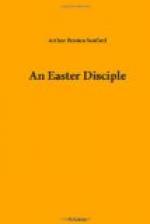But how fares our knight when persecution comes? Through the years he has been bravely declaring the Christian doctrine of the eternal life to priests in the temples, to Roman nobles, to all most hostile. But his wealth and social standing, as well as the emperor’s favor, now insure his safety. His father Marcus has long since passed on, in hope of the heavenly life. Having wedded the graceful Lucretia, when an apostle was in Rome to speak their nuptials, he has her efficient counsel in the testing times.
“Look! look! Lucretia,” he cries, one evening; “through the lower city the flames are running like unbridled horses. There is danger that all Rome may go to ashes.”
For nine long days they watch the sweep of the lurid flames. The light shines out like a signal torch, to mark an emperor’s folly. Then the undeserved charge that they have lit the flames brings on the martyrdom of the Roman Christians. Sometimes Quintus and Lucretia are able to soften the trials of the sufferers, by permission of the capricious Nero. To old Chilo, the Grecian, before he meets his doom, they unfold the promise of eternal reward in the Father’s house. The hope of immortality they carry to those who go to the lions, at the emperor’s whimsical command. And the glorious company of martyrs passes singing to the skies, because of their consoling words.
Down into the dungeon of the Mamertine they are permitted once to go, to visit Paulus. But he needs not their consolation. Rather he is the comforter. With the poise of a conqueror he bids them not to mourn for him: he is going to the Lord in the unending life. Over their bowed heads he stretches his aged hands, in apostolic benediction. Soon ends his imprisonment. At Tre Fontane, in a few days more, his weary body rests; but his immortal spirit mounts beyond the stars.
At last the Christian knight comes to the crossing. The prediction of the augur at Brundisium has been strikingly fulfilled. Matured in all the graces, he is like the ripened Chian clusters that await the vintager in the autumn days. The friends of Quintus have gone before; as the old century wanes, the old man is to follow them.
“My time has come to go,” he says one day; “the portals of eternal life and joy I see swinging open wide. I shall pass through the gates, because my ascended Lord has gone in before me to prepare my dwelling place. With him as my Teacher I believe in the life immortal.”
In the Roman catacombs, those most remarkable testimonies to the eternal life, his resting place may be found. The sign of the fish is on his stone. Its time-eaten inscription is still legible, among the many which tell of the early Christian expectation and of all future Christian hope:
“Here rests the dust of quintus, of noble blood; in the faith of the ascended Lord he has entered upon the eternal life.”




